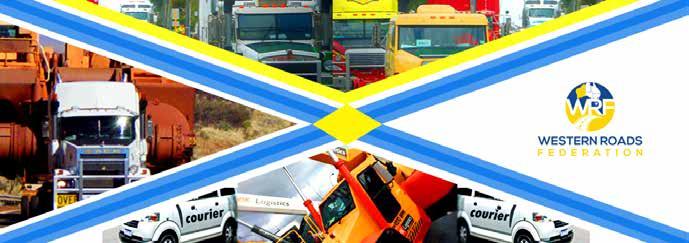
4 minute read
Western Roads Federation – The new government road tax
Over to you WESTERN ROADS FEDERATION byCam Dumesny, CEO
The New Government Road Tax
Advertisement
Federal Government agencies are now using the need to reduce Green House Gas emissions to push the case for a new road transport tax to replace the declining revenue from fuel excise.
Quick Background
• Fuel Excise (the tax on fuel to pay for roads) is declining relative to the increasing distance travelled as we move to more efficient vehicles (including electric vehicles who don’t buy fuel so don’t pay to use roads). That means the Government is not collecting enough tax.
Road Pricing Reform, which is a policy discussion on how Governments can charge to use roads has gone nowhere. This is where you hear the terms massdistance charging, i.e. paying per kilometre per tonne carried. This concept in its current form would effectively destroy regional Australian communities and businesses and the transport companies that support them. By the way, it can also include congestion tax, ie paying to enter cities at peak hours, which has benefits for our industry. But I will explain why another day. Politically, road pricing reform is a poisoned chalice, so it will be a brave government that implements it.
So When All Else Fails – Tax the Truckies
And that is exactly what a bureaucratically titled report released near the beginning of June 2020 by a Federal Agency was all about.
Called “Decarbonisation of Road Transport Network Operations in Australia and New Zealand” the report effectively calls for a new tax on the road transport industry.
Taxing “the Dirty Truckies” is far more politically acceptable as the average voter thinks well that doesn’t affect me.
For the record, in plain English I have added what each of the terms in the report’s recommendations actually means: • Assigning the costs of emissions at source – that means to tax the Trucks and Delivery Vans. • Incentivising efficient or electric vehicles – higher tax for older vehicles and probably no tax for electric. • Incentivising mode shift – Penalise road so we can put more on rail.
Now Here are My Recommendations Assigning the costs of emissions at source
If the Government was serious about reducing Green House Gas emissions from the transport sector, then place a charge on consumers and business customers.
Consumers and business customers drive supply chain mode choices not the transport industry.
For example, an inner-city hipster sipping on a turmeric latte whilst ordering Online the latest book on say
“Protecting free-range tofu burgers from Machiavellian corporate predators” is the ONE GENERATING THE GREENHOUSE GAS (GHG). (ps if the book title makes no sense to you, then you can imagine what it’s like for me listening to my inner-city turmeric lattesipping hipster daughter.)
Why, because naturally, the consumer wants the book in a couple of days or less. That means somewhere probably overseas, the order is received, packed, and sent by the fastest means possible. That will be a Cargo Jet, the highest GHG emitter of all transport modes. When it lands it will be processed and dispatched by land transport to the home.
You can use any example you like, but it is consumers who are demanding fast delivery. Therefore,
consumers are the ones forcing the transport mode selection so therefore they should be the ones who pay, not the transport industry.
Incentivising efficient or electric vehicles
Secondly, if you want the industry to adopt more efficient low emission vehicles give them a commercial incentive to do so. If you use say a Euro 5 vehicle for waste collection, then provide an incentive like removing all time curfews on waste collections or similar. There are so many different productivity incentives that could make it commercially attractive to adopt low or zero-emission vehicles.
We don’t need taxation and regulatory penalties; we need real incentives.
Incentivising mode shift
Rail has its place, it does some transport tasks far better than road, but it needs to stand on its own feet commercially.
Stopping road productivity or penalising it in order to prop up rail is a bad national policy. As it means that Australia as a global trading nation is hamstringing itself by adding costs to its internal transport task so making our exports are less competitive. That translates to less money coming in and fewer jobs.
Finally, no consideration has been given to re-designing supply chains to reduce GHG, happy to discuss what that means. And no consideration of drones and other emerging technologies that could also add new modes and solutions.
So don’t use GHG emissions as an excuse to create a new Road Tax.
WESTERN ROADS FEDERATION IS THE UNITED VOICE OF WA TRANSPORT COMPANIES Western Roads Federation has been formed to give a strong unified voice for companies who use WA roads for commercial benefit. Western Roads Federation is a membership driven organisation. If you believe in the industry and what you do, then make sure your company is a member, and get involved. For a membership application form Email cam.dumesny@westernroads.com.au ◆ Phone 08 9365 7799 or 0481 064 371 180 Hay St, East Perth WA 6004










